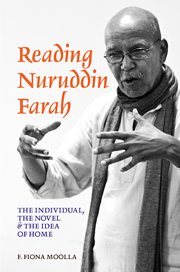Book contents
- Frontmatter
- Contents
- Introduction
- 1 Defining the Individual: Conceptual & Historical Limits
- 2 From a Crooked Rib & the Bildungsroman: Developing the Self, Developing the Nation
- 3 The ‘Gynocentric’ Bildungsroman: Sardines & Gifts
- 4 Modernism in A Naked Needle & Sweet & Sour Milk: Irony, Morality & the Aesthetic
- 5 Close Sesame & the Representation of Heteronomy
- 6 Dissolving the Boundaries of Self & Nation in Maps & Secrets
- 7 Reconstructing the Subject in the Third Trilogy: Links, Knots & Crosbones
- Conclusion
- Bibliography
- Index
6 - Dissolving the Boundaries of Self & Nation in Maps & Secrets
Published online by Cambridge University Press: 05 April 2014
- Frontmatter
- Contents
- Introduction
- 1 Defining the Individual: Conceptual & Historical Limits
- 2 From a Crooked Rib & the Bildungsroman: Developing the Self, Developing the Nation
- 3 The ‘Gynocentric’ Bildungsroman: Sardines & Gifts
- 4 Modernism in A Naked Needle & Sweet & Sour Milk: Irony, Morality & the Aesthetic
- 5 Close Sesame & the Representation of Heteronomy
- 6 Dissolving the Boundaries of Self & Nation in Maps & Secrets
- 7 Reconstructing the Subject in the Third Trilogy: Links, Knots & Crosbones
- Conclusion
- Bibliography
- Index
Summary
[Incomprehensibility arises] if one speaks of irony ironically without in the process being aware of having fallen into a far more noticeable irony; if one can't disentangle oneself from irony anymore … But is incomprehensibility really something so unmitigatedly contemptible and evil? Methinks the salvation of families and nations rests upon it.
(Friedrich Schlegel, “On Incomprehensibility”, 1800)This chapter picks up the thread from Chapter 4 where a modernist resolution of the contradiction of individualism was explored. Chapter 5 was tangential to the argument. It considered the one exception in Farah's oeuvre, namely, Close Sesame, which attempts to represent a heteronomous subject through the narrative mode of the novel which privileges autonomy. Earlier the central compromise of realism was explored. Realism compromises the contradiction that individual autonomy finally submits to socialisation through irony in closure. Chapter 4 suggests that the techniques of modernism allow irony to reflect on itself. Self-reflexive irony is inherently concerned with aesthetic questions and tends to take the form of textuality. The contradiction encountered by realism disappears in the idea that both the self and society are literary constructs. Postmodernism, this chapter argues, assumes what modernism shows through various formal techniques. Modernism shows that the subject is a collage of literary fragments. Postmodernism proceeds from the idea of the divided subject. This chapter proposes, through a reading primarily of Maps, the Farah novel which provoked the greatest scholarly interest, that postmodern “schizophrenic” identity is not a radical critique of the autonomous subject for whom the ethical sources are constructed through individual reason or intuition.
- Type
- Chapter
- Information
- Reading Nuruddin FarahThe Individual, the Novel and the Idea of Home, pp. 142 - 154Publisher: Boydell & BrewerPrint publication year: 2014



